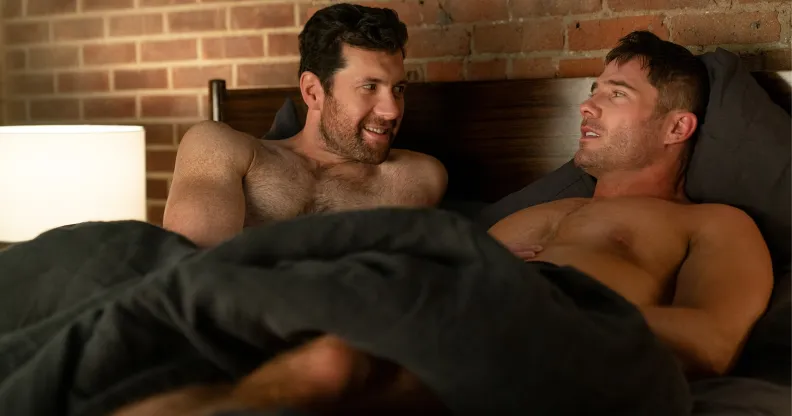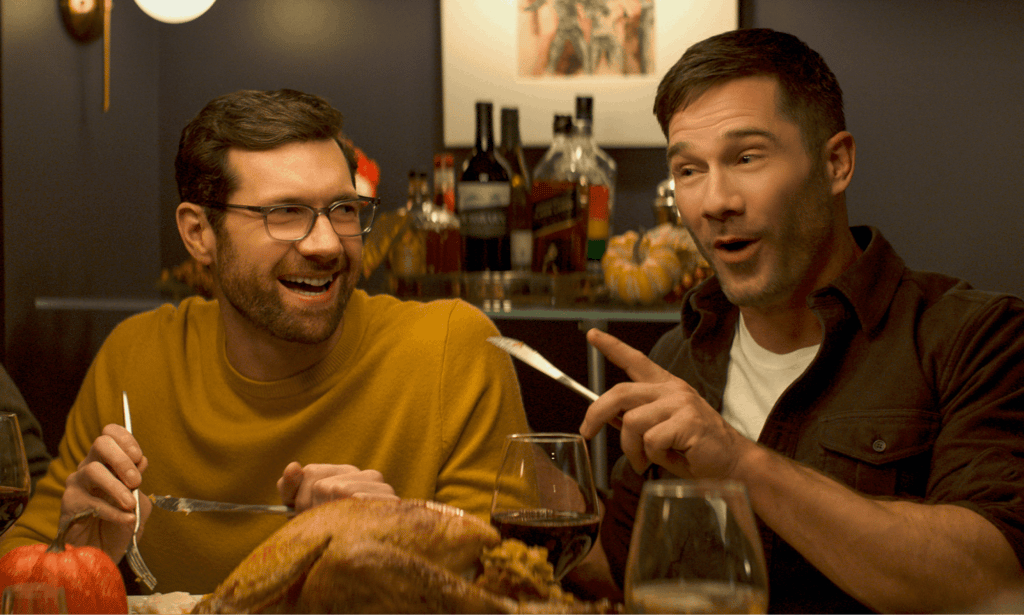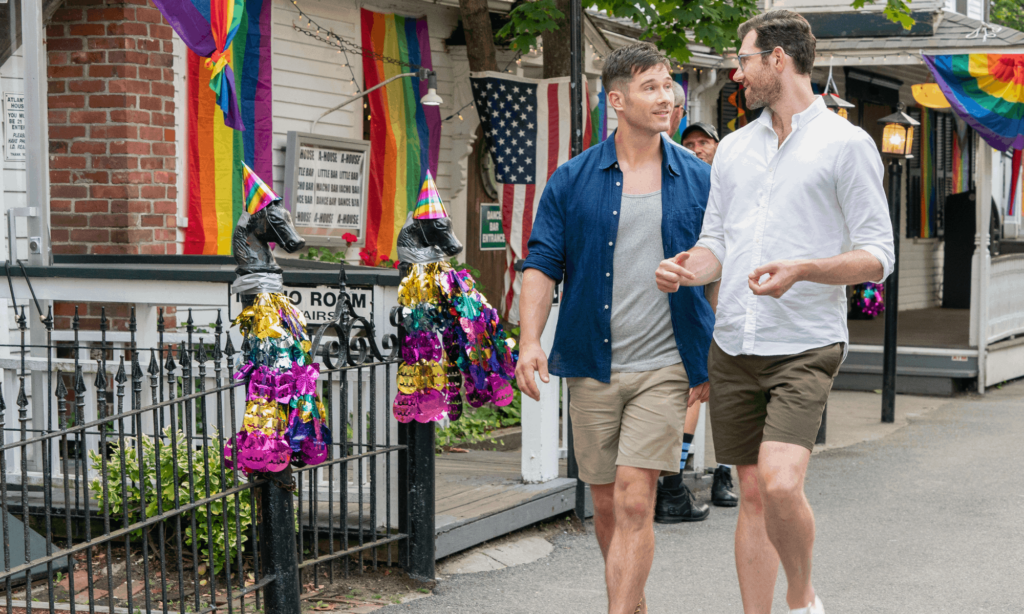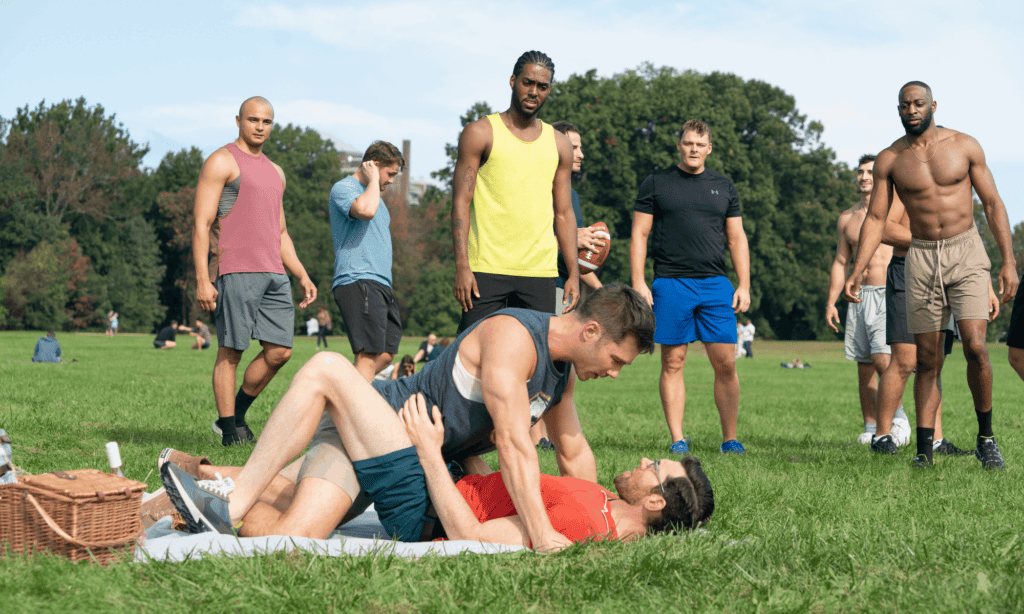Bros’ Billy Eichner and Luke Macfarlane talk sex, love and steroids: ‘You can’t represent everyone’

Billy Eichner and Luke Macfarlane don’t shy away from sex scenes in Bros. (Universal)
Billy Eichner and Luke Macfarlane talk Bros, the film that launched a thousand think pieces and even more Twitter threads.
Bros was co-written by Eichner and director Nicholas Stoller, with Bridesmaid’s Judd Apatow co-producing.
It’s been billed as the first major studio gay rom-com with an all-queer cast, and naturally, with such a large weight on its shoulders, its release has sparked intense discourse about LGBTQ+ media, representation and even the future of cinema.
The story follows Bobby (Billy Eichner), a queer history podcaster and museum director who is navigating the trials and tribulations of single life in New York, from awkward Grindr hookups to wading through shirtless men at gay bars.

Bros. (Universal)
He’s at a launch part for “Zellwegr” – an app for gay men who like to talk about actresses – when he meets Aaron (Luke Macfarlane), an emotionally closed-off guy with bulging muscles and a pipe dream of becoming a chocolatier.
Together, Bobby and Aaron encounter the various hurdles of gay relationships. We see them attempt to navigate complex topics like body issues, gay shame and monogamy – all on an irreverent backdrop of the jokes, stereotypes cultural references that underpin so much of queer life.
Will Bobby and Aaron end up on the gay relationship graveyard, or will they go the distance?
As the film reaches UK cinemas, PinkNews caught up with Eichner and Macfarlane to talk about sex scenes, heteronormativity, steroids, meeting the high expectations of LGBTQ+ audiences and, of course, the discourse.
PinkNews: There can be a lot of pressure on portrayals of gay life in pop culture. Was that something that you both felt while making the film?
Billy Eichner: I always feel pressure to deliver, but ultimately, you have to try to ignore that pressure. Because there’s only one or two stories you can tell within the confines of one movie, you know? You can’t speak to the existence of every single LGBTQ+ person. It’s a very eclectic community and one movie can only carry the weight of the characters you are trying to tell the story about.
Luke Macfarlane: There is this particular pressure, though, of making this kind of movie, because we have so few of them. I’ve said this before, but like no one said of Julia Roberts and George Clooney, “that’s not an accurate portrayal of a recently divorced couple”, right? But we have to do that, because we have so few opportunities.

Bros. (Universal)
Luke, you’ve played gay roles in shows like Brothers and Sisters and films like Single All the Way, do you feel like more gay roles are available to actors now?
Luke: There’s definitely more availability and that’s because it’s so many different factors, including the visibility and success of some of the gay performers who have been trailblazers. But also we just have so many different mediums by which you can make content, whether that’s streaming or TikTok or whatever. So I’m definitely noticing more of it and I’m grateful for it!
There are quite a few sex scenes in the film, when the rom-com standard tends to be one. Was that important to you to use sex as a part of telling this very gay metropolitan story?
Billy: We never sat down and said, “Let’s put sex scenes in here to shock the audience or be provocative”, you know? It was always about what would happen next, and what’s funny and what’s truthful.
Some are heightened for comedic effect, obviously, because we’re making a comedy, but they’re also experiences that I’ve had, or my friends have had. Gay men do tend to be a bit more liberated than maybe the average couple, I guess. And so, that sort of just felt like it would naturally play into the story as these guys trying to figure out if and how they can commit to each other.
It's here, it's queer, and it's the hottest film of the year! Bros. Out in UK cinemas Oct 28th. Book your tickets now and get ready to cry, scream and laugh. #BrosMovie Find out more: https://t.co/wzRhlN4oI7 #ad @universaluk pic.twitter.com/BQU24DaUiJ
— PinkNews (@PinkNews) October 24, 2022
One thing that was really interesting was the steroid use in the film. Why was that something you wanted to explore?
Billy: The movie is ultimately for both characters in different ways, about how they put up a front to the world. And that’s not an aspect of all gay men’s lives, of course, but I know a lot of friends who use steroids or testosterone, or some type of supplement to make them more ripped.
That is part of Luke’s character’s armour. He uses that buff physique as part of what gives him confidence in what draws people to him. But ultimately, it’s not natural, right? And so it’s a form of armour, that he is sort of conjuring, because he feels the pressure to present that way to the world. That’s how he gets validation.
I think a lot of gay men I know, not all but a lot, have experienced that and feel that. And I’ve had friends, even since they’ve seen the movie, friends of mine who already have good bodies who see Bros, then they’ll go on a date and say: “I know this isn’t your movie, but I kind of feel like I should be doing steroids!”
There was a real juxtaposition of sex and intimacy in the film, which guides us through the different intimacy issues these men have. Luke, was that something that drew you towards the script?
Luke: Yes, and it feels intrinsically gay. Especially as it relates to the idea of masculinity being “more appealing” to people. But that’s not just a gay male thing, that’s a male thing; that we have to be tough and strong. These are the versions that we see in culture.
The men that we all want to aspire to be, they’re not the ones who are bringing roses and reading poetry to their lover, they’re bashing heads and being tough as hell. So I can relate to that. And there are certain times in my life when I’ve wanted to be seen as strong.

Bros. (Universal)
So much of the humour I thought was very LGBTQ+ specific. How did you strike that balance between creating a film that LGBTQ+ people are going to love and laugh at, but then also something that other people are going to find funny too?
Billy: Ultimately, you know, we never sat down and said: “Alright, this will be a reference for gay people and this will be a reference for straight people.” We just wrote the funniest movie we could and the funniest jokes we could, then hoped that enough people would be able to understand and relate to it.
There’s been a lot of discourse surrounding this film, which I know will not have escaped you. I can’t remember a film that has got this many people on my Twitter timeline talking. What has it been like to witness all of that play out about something that you’ve made?
Billy: Yeah, I think it’s part of the world we live in. I think LGBTQ+ or gay male-driven stories can sometimes attract a disproportionate amount of discourse. I also think there’s a certain pressure on things about marginalised groups of people to perform in a certain way. And you know, that is sort of the nature of the beast on Twitter.
But, you know, for me, the discourse is not the movie. I would say probably 90 per cent of it comes from people who probably haven’t seen the movie. Then it becomes discourse about discourse. I’m more than happy to talk to people about the movie, if they’ve seen the movie!
Luke: I also think, within LGBTQ+ community, we love to dissect stuff. It’s hard for us to receive things at face value.
Billy: Yeah, I also think we haven’t had a lot of movies like this, which have been marketed this aggressively. And I think when you haven’t gotten a lot of something, there’s there’ll be a part of the community that really wants to celebrate it and there’ll be a part of the community which thinks: “Well, I don’t know, you know, I don’t see myself in this exactly”, so feel a bit alienated by it, or kind of angry.
What do you want the legacy of Bros to be? How would you like it to be remembered?
Billy: I hope people think that it’s a really funny movie where we tried to show a multi-dimensional gay man at the centre of his story, when often mainstream pop culture portrays gay male characters to be a sidekick, or a best friend, or a device just to tell jokes and then scurry away.
The characters are more than we think they are underneath when you meet them. And that the movie is uplifting and hopeful about life and romance.
Bros is in cinemas now.

